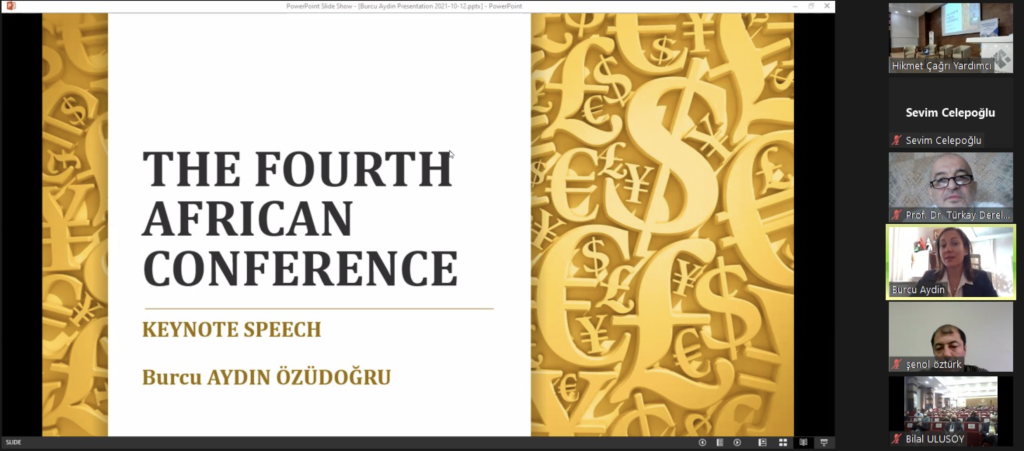
THE FOURTH AFRICAN CONFERENCE
KEYNOTE SPEECH by DR. BURCU AYDIN ÖZÜDOĞRU
Dear Sir/Madam,
I would like to thank you for inviting me as the keynote speaker to the 4th African Conference, organized by Hasan Kalyoncu University’s (HKU) African Studies Application and Research Center, and Development Studies Application and Research Center.
I am delighted be here, in this conference, with esteemed scholars, researchers, and those, interested in the African continent.
Today, I would like to give my speech focused on three areas based on my work experience and the most imminent needs of the continent. These are:
- Africa from the International Monetary Fund’s (IMF) Perspective
- Africa from the Turkish Public Sector’s Perspective
- Africa amid Covid-19 Pandemic
Africa from the International Monetary Fund’s Perspective:
After receiving my Ph.D. degree from the University of Southern California, USA, I started working at the IMF as an economist. During my employment at the IMF, I have worked at the African department, covering South Africa and Ghana as a desk economist, and doing real exchange rate assessment work for the whole continent. Therefore, I would like to first start my speech covering Africa from an intergovernmental perspective, based on my work at the IMF.
As you know, IMF is an organization of 190 countries aimed to foster financial stability and contribute to the wellbeing of world citizens. I believe I can summarize its work on Africa under three headings: economic programs, surveillance, and capacity development.
IMF’s Economic Programs:
Let me first start by IMF’s economic programs, or in other words IMF lending to countries that need financial assistance amid turbulent times. IMF lending to countries is conditional on a country to agree to follow an economic program that aims to restore conditions for a stable economy.
Most countries seek financial assistance from the IMF when borrowing from the international financial markets is rather not available due to a financial turbulence, governments’ unsustainable economic management and/or the meagre state of countries’ economic capacity.
With the outbreak of Covid-19 pandemic in 2020, most of these conditions have become more relevant for numerous countries all around the world, and the IMF lent $165 billion to 83 countries, nearly half of them are from the African continent. The same year, IMF financial lending to low-income countries increased to $13 billion, up from around $2 billion a year before the pandemic. Countries of sub-Saharan Africa received more than half of these funds.
During my employment at the IMF, I have worked on Ghana’s economic program. Ghana was considered to be a middle income African economy, but with low state of physical and institutional infrastructure, and significant financing needs. During the late 2000s, Ghana discovered a substantial size of oil and gas resources, and I was tasked to analyze the significance of this discovery on the country’s economic growth prospects. At that time, I did a cross country analysis based on the economic performance of resource-rich economies, and showed that natural resources contribute to the growth performance of a country should a country have solid institutional and governance capacity. Otherwise, countries would be doomed with a resource curse.
IMF Surveillance:
The second line of assistance that IMF provides to its members is surveillance. IMF reviews the economic and financial policies of all of its member states on an annual basis. These reviews are knows as the “Article IV Consultations” as they are required by the Article IV of the IMF’s Articles of Agreement that each country agrees by joining the IMF.
With these reviews, IMF aims to bring the opinions of the global community on the economic management of its member state, and provide the lessons of the international experience to the national economic management team. One can consider these reviews as an economic and financial health checkup of a country.
During 2009-10, I worked on South Africa as a desk economist. South Africa is the most prominent economy of the continent, with vast natural resources, deep capital markets, but significant developmental & equity issues.
During my work at the IMF, I followed up closely the South African economy, contributed to the Article IV Consultation Reports, and did research on its economy. My research back then focused on the fiscal performance of South Africa. Throughout my studies, I highlighted that a country with natural resources should manage its budget by decomposing the impact of commodity and business cycle off its revenue. I claimed that spending based on structural revenues would help South Africa manage better through cyclical downturns.
IMF surveillance also extends beyond a country covering regional and global surveillance. These surveillance entail the economic trends, developments and key policy issues in the region and global economy. The IMF, in its latest African Economic Outlook, highlighted the negative impact of the Covid-19 pandemic and the accelerated pace of the climate change on the prospects of the African continent.
IMF’s Capacity Development Work:
Last, the IMF helps improve the institutional capacity of its member states by training authorities and equipping them with analytical tools. For instance, during my work at the African department, I worked on developing an exchange rate assessment toolbox for sub-Saharan economies. With my toolbox, I provided four different methods of exchange rate assessment for sub-Saharan African economies, using a panel dataset covering 182 countries from 1973 to 2014. This toolbox helped economists assess the value of African countries’ real exchange rates and therefore their external balances.
In its capacity building work, the IMF also manages regional training centers to help develop countries’ policymaking capacity by transferring economic skills and best practices. The Africa Training Institute, located in Mauritius, delivers a broad curriculum of courses designed to the needs of African policymakers and their economies.
Africa from the Turkish Public Sector Perspective
In the second part of my speech, I would like to focus my talk on Africa from the Turkish public sector point of view. I worked at the Turkish Ministry of Finance and Treasury during the years 2012 through 2019, first as the chief economic advisor to the Ministry of Finance and the Deputy Prime Minister, and lately as the Director of Revenue Policies Department.
On the public perspective, I will try to focus on the work that aims to improve the economic ties between the two regions. Therefore, first I will give a glimpse of economic ties between Turkey and the African continent. Then I will focus on areas of cooperation for the public sector.
Turkey’s Economies Ties with the African Continent
Let me first start with Turkey’s economies ties with the region. Despite geographic proximity of the African continent to Turkey, economic trade is limited. In the year 2020, total trade volume with Africa was around $25.3 billion, of which $10 billion was with sub-Saharan Africa. The same year, Turkey’s total trade volume was around $389 billion. Therefore Africa constituted 6 percent, and sub-Saharan Africa only 3 percent of total trade with Turkey.
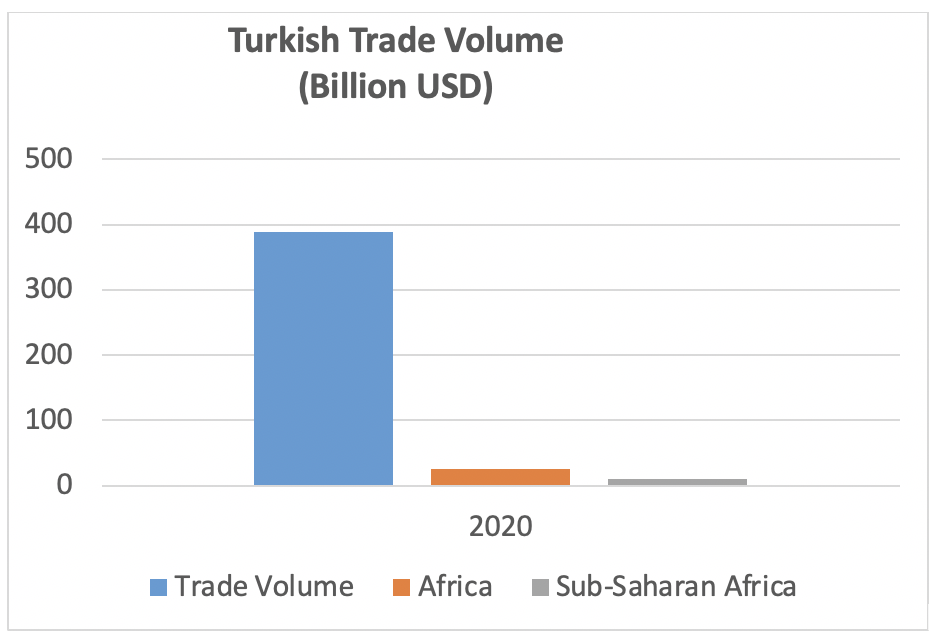
| Source: DEIK and Turkstat |
Looking at the details of the economic activity, one can see that even though being limited, economic integration increases in the field of construction. In 2020, Turkey’s volume of total international construction projects was around $400 billion, and $71 billion of that generated from Africa and $20 billion from sub-Saharan Africa. Consecutively, these correspond to a share of 18 percent and 5 percent in Turkey’s total volume of construction projects.
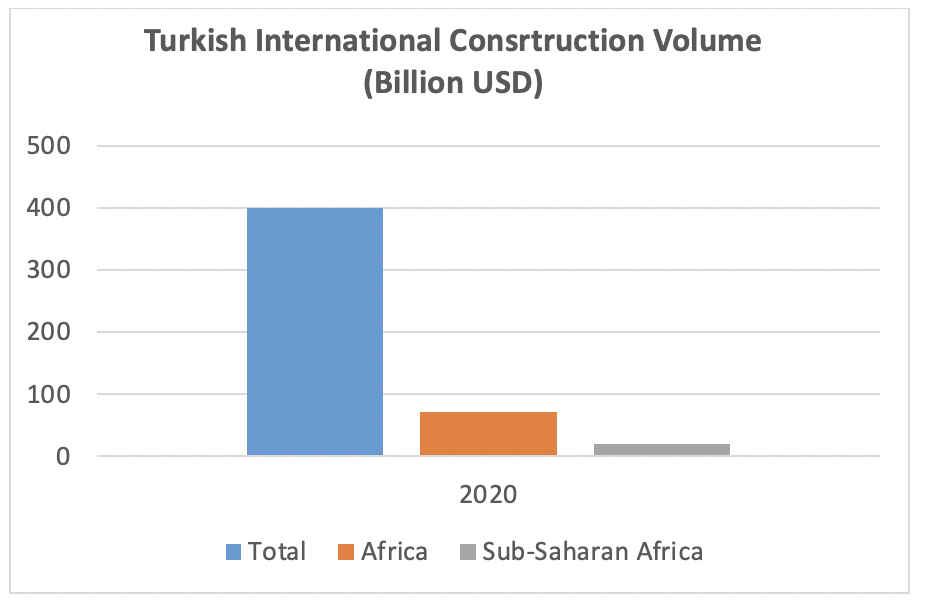
| Source: DEIK and Turkstat |
Areas of Cooperation for the Public Sector
After covering the economic linkages between the two regions, now I want to focus on areas of cooperation for the public sector with an emphasis on taxation. Turkish Revenue Administration aims to facilitate economic ties by setting the terms of taxation of companies engaged in work internationally via Avoidance of Double Taxation Agreements (ADTA). ADTA is a tax treaty signed between two or more countries in order to help companies, which are tax resident in one country but earn income in another, to avoid paying double taxes on the same income. Therefore it aims to facilitate trade volume by creating a level playing field.
As of 2020, Turkey has signed a total of 87 ADTA, of which only 8 belongs to African countries. Most of these agreements were ratified during the late 2000s. For instance the first ADTAs were signed with Algeria and Egypt in year 1997, and then with Sudan in 2006, Morocco and South Africa in 2007, with Ethiopia in 2008, and with Gambia in 2019 and Rwanda in 2021.
Of course, in addition to taxation, there are other major areas of cooperation between the Turkish public sector and that of Africa. I can say these efforts are mostly concentrated on:
- Aid & donation
- Improving cultural relations
- Military assistance
Africa amid Covid-19 Pandemic
On the last part of my speech today, I would like to focus on Africa amid Covid-19 Pandemic with a trajectory on health, equity and development.
Health Cost of the Pandemic
Covid-19 pandemic has reflected into a human tragedy in the region. Through fall 2021,
- There has been 1 million new infections about every 50 days
- 8.5 million or more reported infections
- 214,000 reported deaths
Implementation of vaccination has also disappointed in the region. For instance the World Health Organization target for Covid-19 vaccination for all countries was to vaccinate 40 percent of the population by end-2021 and 70 percent of the population by mid-2022.
By September 2021, Africa’s vaccination rate remained at 4.4 percent, a very low rate compared to that of the richer world. For instance during the same period, vaccination rate was 66 percent in the UK, 62 percent in the EU, and 55 percent in the USA.
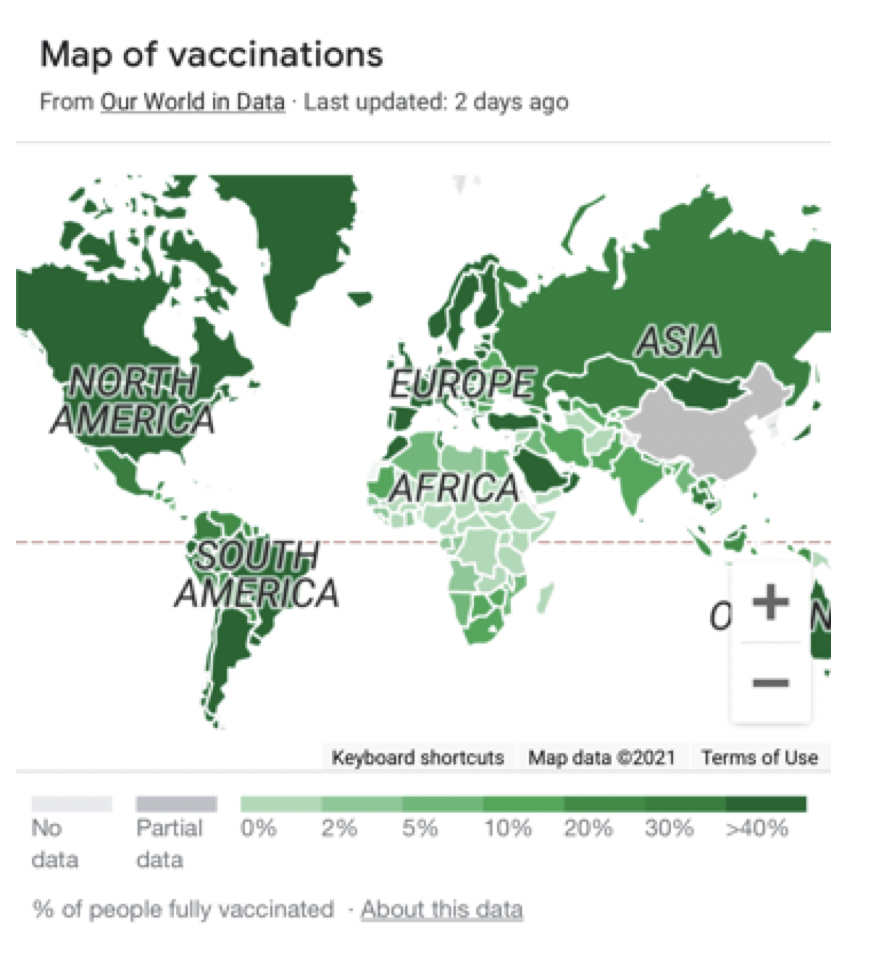
Again based on the WHO targets, only 15 African countries met the 10 percent vaccination target. Half of the African countries vaccinated less than 2 percent of their population. And even worse, countries with large populations have fallen behind such as Egypt with a 5 percent vaccination rate, and Ethiopia and Nigeria each less than at 3 percent.
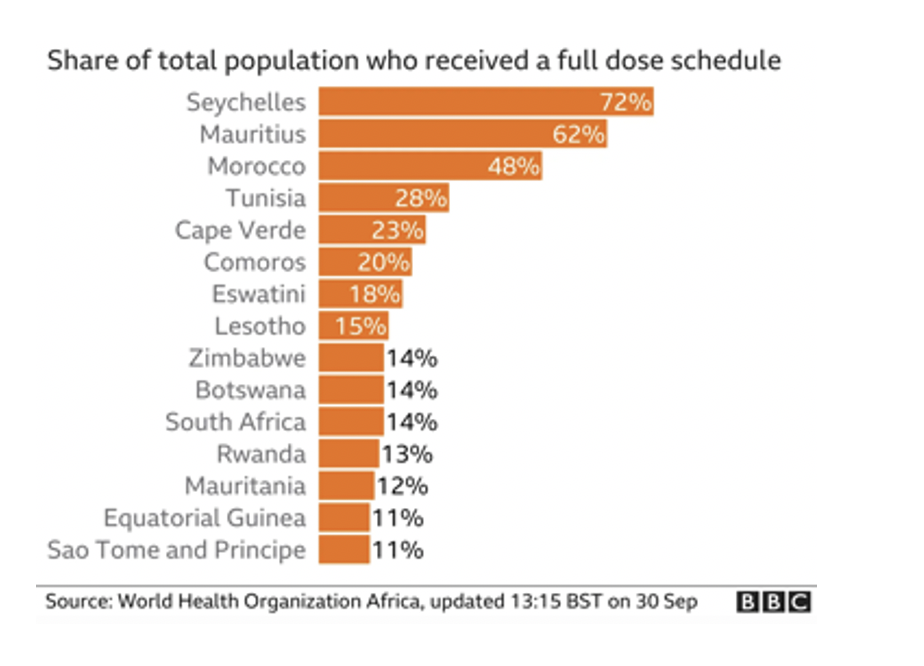
Economic Cost of the Pandemic
The economic impact of Covid-19 on Africa has also been quite disruptive. 2020 became Africa region’s first recession in over 25 years. Sub-Saharan Africa became the world’s slowest growing region in 2021. This is quite disappointing considering that the region is already one of the least developed regions in the world. A slower economic growth rate in a poorer region indicates that the income gap between sub-Saharan Africa and the rest of the world will widen going forward.
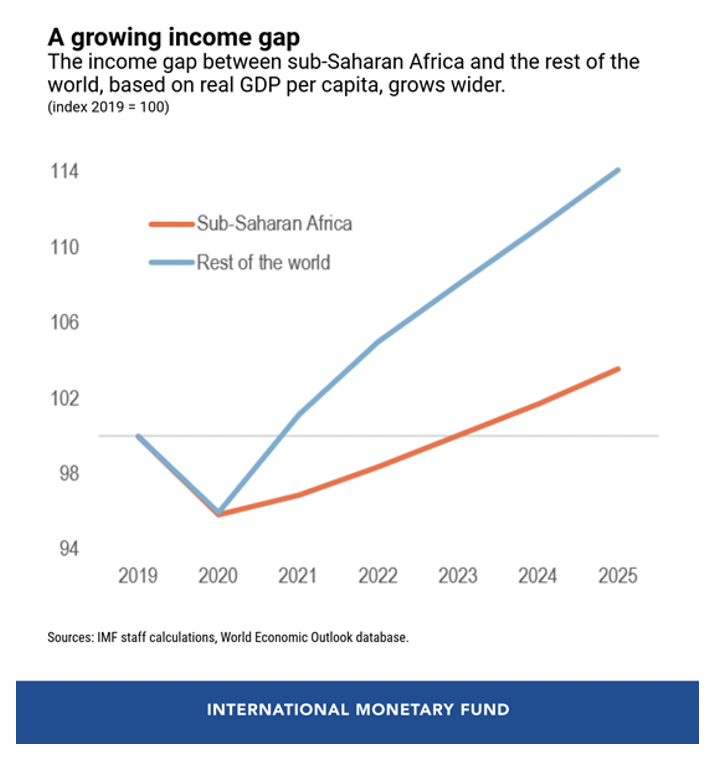
Through the pandemic, vulnerable groups, such as the poor, informal sector workers, women, and the youth suffered disproportionately. The IMF states that this could push up to 40 million people into extreme poverty.
What Should be Done?
So, let’s know focus on what should be done to mitigate the impact of the Covid-19 pandemic on the continent.
Foremost, I believe local and international efforts should focus on a better distribution vaccine roll out in the region. IMF staff claims that a $50 billion plan to reach WHO goals would boost global activity by $9 trillion by 2025. Therefore higher vaccination rates in the region will not only curtail the health consequences but also the economic impact of the pandemic.
Second, considering the economic disorder in the region, international efforts should concentrate on providing liquidity to the region. In many economies of the region, interest payments have reached 20 percent of tax revenue and even exceeded one-third of revenues in some countries. Public debt in North Africa rose by about 12ppts to 88 percent of GDP. Therefore liquidity injection is a must for governments to provide for basic public services and infrastructure needs.
Last, efforts should concentrate to ensure a better governance and enhance quality of institutions in the region. Without good planning and management of resources, it will be difficult to ensure the efficient distribution of resources. Institutions to ensure checks and balances should also be strong to secure accountability and public’s trust to the public procurement of resources.
Closing
Here I end my keynote speech on the 4th African Conference, organized by Hasan Kalyoncu University.
I thank you for your patience for listening to me, and I am also ready to take any questions from the audience.
Sincerely,
Dr Burcu Aydin Ozudogru
Ex-IMF Economist, Ex-Director of Revenue Policies at the Turkish Ministry of Finance
Part-Time Faculty at Bilkent University
